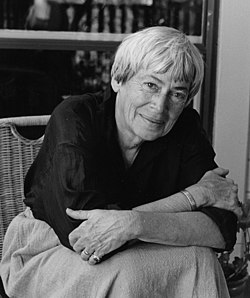Ursula K. Le Guin Quote
His themes were not pride and love at all, though he used the words perpetually; as he used them they meant self-praise and hate. He talked a great deal about Truth also, for he was, he said, cutting down beneath the veneer of civilization.It is a durable, ubiquitous, specious metaphor, that one about veneer (or paint, or pliofilm, or whatever) hiding the nobler reality beneath. It can conceal a dozen fallacies at once. One of the most dangerous is the implication that civilization, being artificial, is unnatural: that it is the opposite of primitiveness… Of course there is no veneer, the process is one of growth, and primitiveness and civilization are degrees of the same thing. If civilization has an opposite, it is war. Of those two things, you have either one, or the other. Not both.
His themes were not pride and love at all, though he used the words perpetually; as he used them they meant self-praise and hate. He talked a great deal about Truth also, for he was, he said, cutting down beneath the veneer of civilization.It is a durable, ubiquitous, specious metaphor, that one about veneer (or paint, or pliofilm, or whatever) hiding the nobler reality beneath. It can conceal a dozen fallacies at once. One of the most dangerous is the implication that civilization, being artificial, is unnatural: that it is the opposite of primitiveness… Of course there is no veneer, the process is one of growth, and primitiveness and civilization are degrees of the same thing. If civilization has an opposite, it is war. Of those two things, you have either one, or the other. Not both.
Related Quotes
You can lead if you can serve. You can serve when you can love. You can love when you are graced. The truth is that God knows love will be needed in volumes, this is why he made his grace abundant. Le...
The problem that I think I have with God is often not a problem at all. Rather, it is most frequently a tired misperception where I have made God what I need Him to be in order to justify my rejection...
Just because something isn't a lie does not mean that it isn't deceptive. A liar knows that he is a liar, but one who speaks mere portions of truth in order to deceive is a craftsman of destruction.
We have a predator that came from the depths of the cosmos and took over the rule of our lives. Human beings are its prisoners. The Predator is our lord and master. It has rendered us docile, helpless...
Scientists and inventors of the USA (especially in the so-called "blue state" that voted overwhelmingly against Trump) have to think long and hard whether they want to continue research that will help...
We live in a world where unfortunately the distinction between true and false appears to become increasingly blurred by manipulation of facts, by exploitation of uncritical minds, and by the pollution...
About Ursula K. Le Guin
Le Guin was born in Berkeley, California, to author Theodora Kroeber and anthropologist Alfred Louis Kroeber. Having earned a master's degree in French, Le Guin began doctoral studies but abandoned these after her marriage in 1953 to historian Charles Le Guin. She began writing full-time in the late 1950s and achieved major critical and commercial success with A Wizard of Earthsea (1968) and The Left Hand of Darkness (1969), which have been described by Harold Bloom as her masterpieces. For the latter volume, Le Guin won both the Hugo and Nebula awards for best novel, becoming the first woman to do so. Several more works set in Earthsea or the Hainish universe followed; others included books set in the fictional country of Orsinia, several works for children, and many anthologies.
Cultural anthropology, Taoism, feminism, and the writings of Carl Jung all had a strong influence on Le Guin's work. Many of her stories used anthropologists or cultural observers as protagonists, and Taoist ideas about balance and equilibrium have been identified in several writings. Le Guin often subverted typical speculative fiction tropes, such as through her use of dark-skinned protagonists in Earthsea, and also used unusual stylistic or structural devices in books such as the experimental work Always Coming Home (1985). Social and political themes, including race, gender, sexuality, and coming of age were prominent in her writing. She explored alternative political structures in many stories, such as in the philosophical short story "The Ones Who Walk Away from Omelas" (1973) and the anarchist utopian novel The Dispossessed (1974).
Le Guin's writing was enormously influential in the field of speculative fiction, and has been the subject of intense critical attention. She received numerous accolades, including eight Hugos, six Nebulas, and twenty-five Locus Awards, and in 2003 became the second woman honored as a Grand Master of the Science Fiction and Fantasy Writers of America. The U.S. Library of Congress named her a Living Legend in 2000, and in 2014, she won the National Book Foundation Medal for Distinguished Contribution to American Letters. Le Guin influenced many other authors, including Booker Prize winner Salman Rushdie, David Mitchell, Neil Gaiman, and Iain Banks. After her death in 2018, critic John Clute wrote that Le Guin had "presided over American science fiction for nearly half a century", while author Michael Chabon referred to her as the "greatest American writer of her generation".
